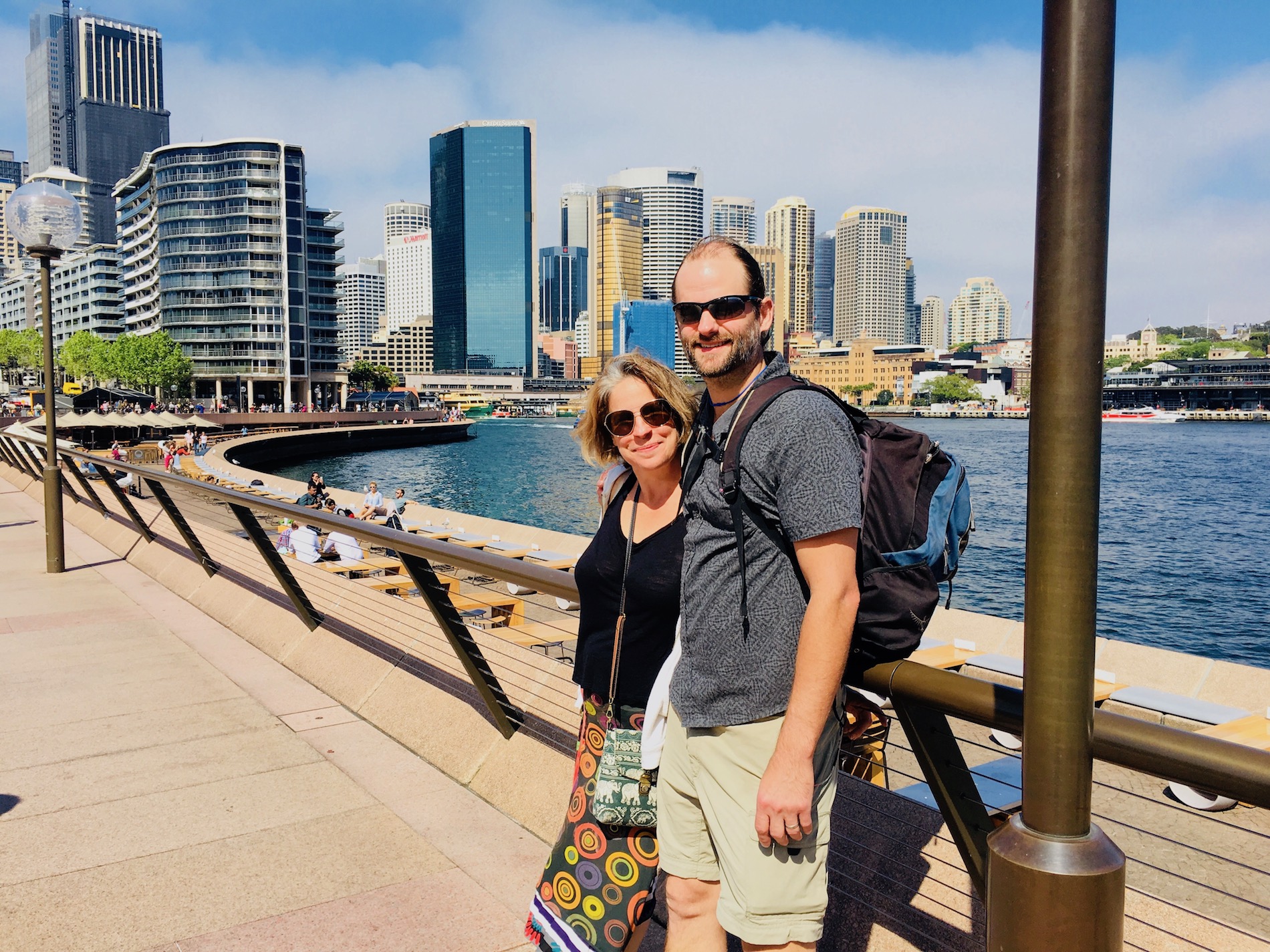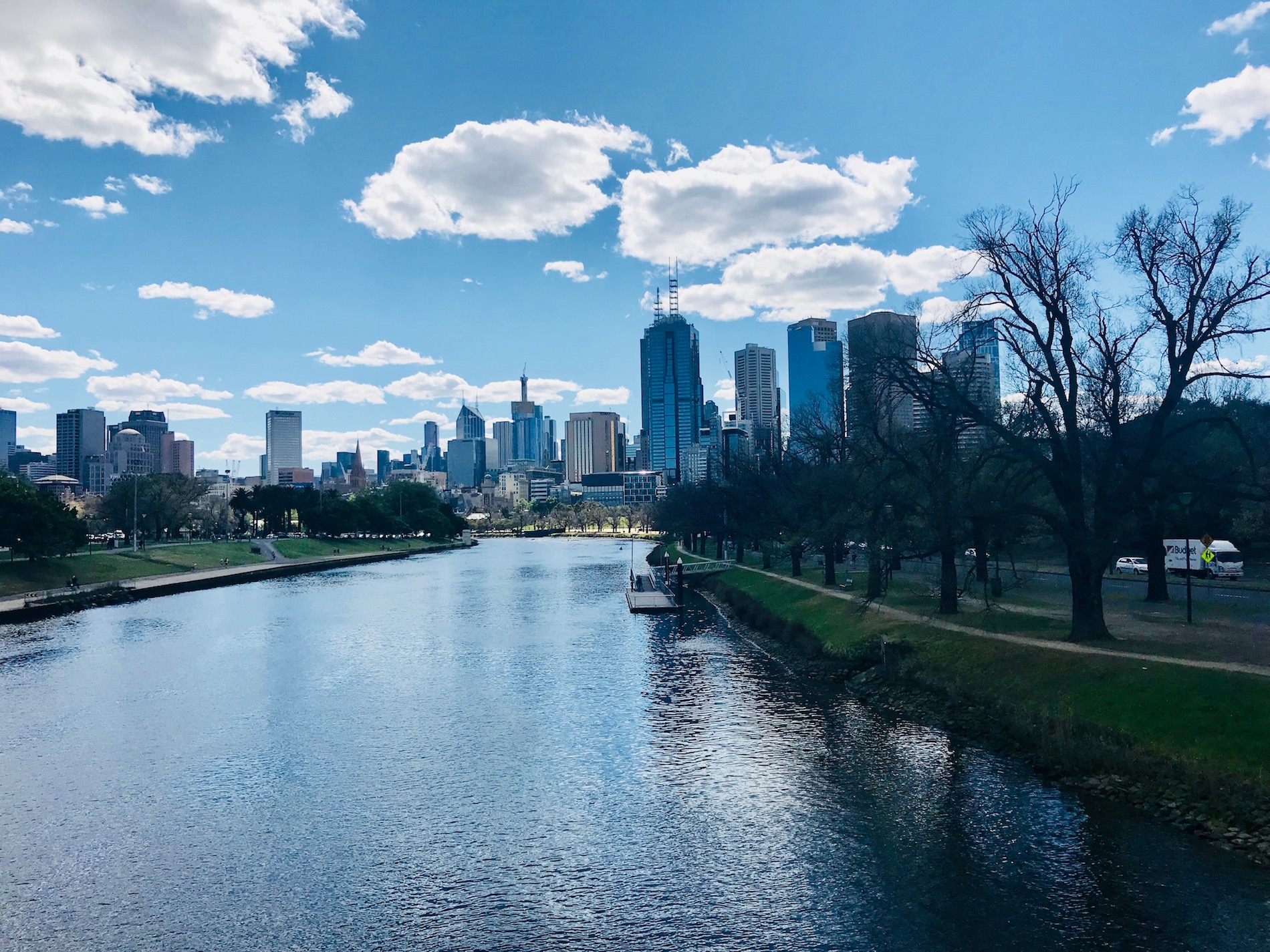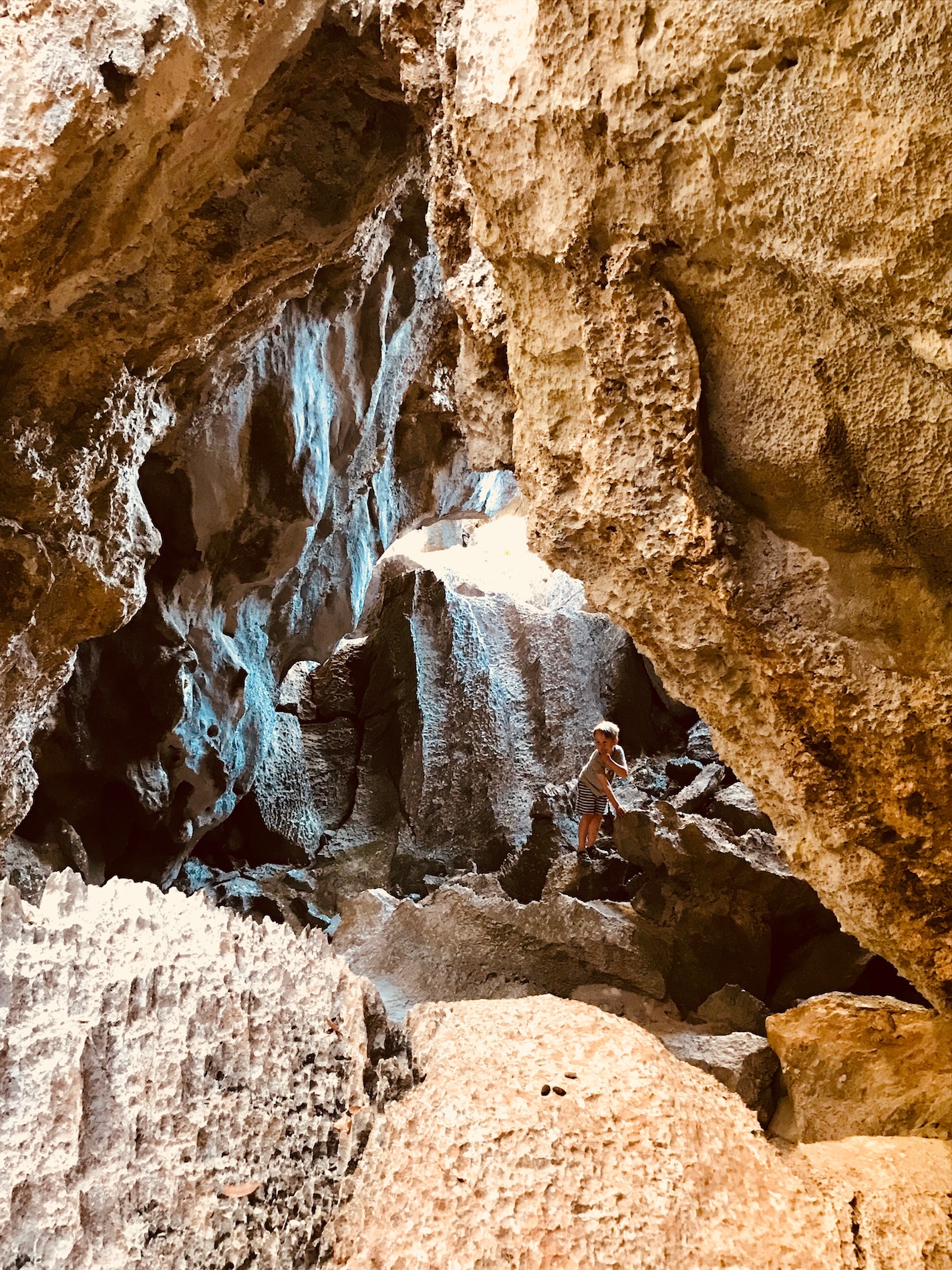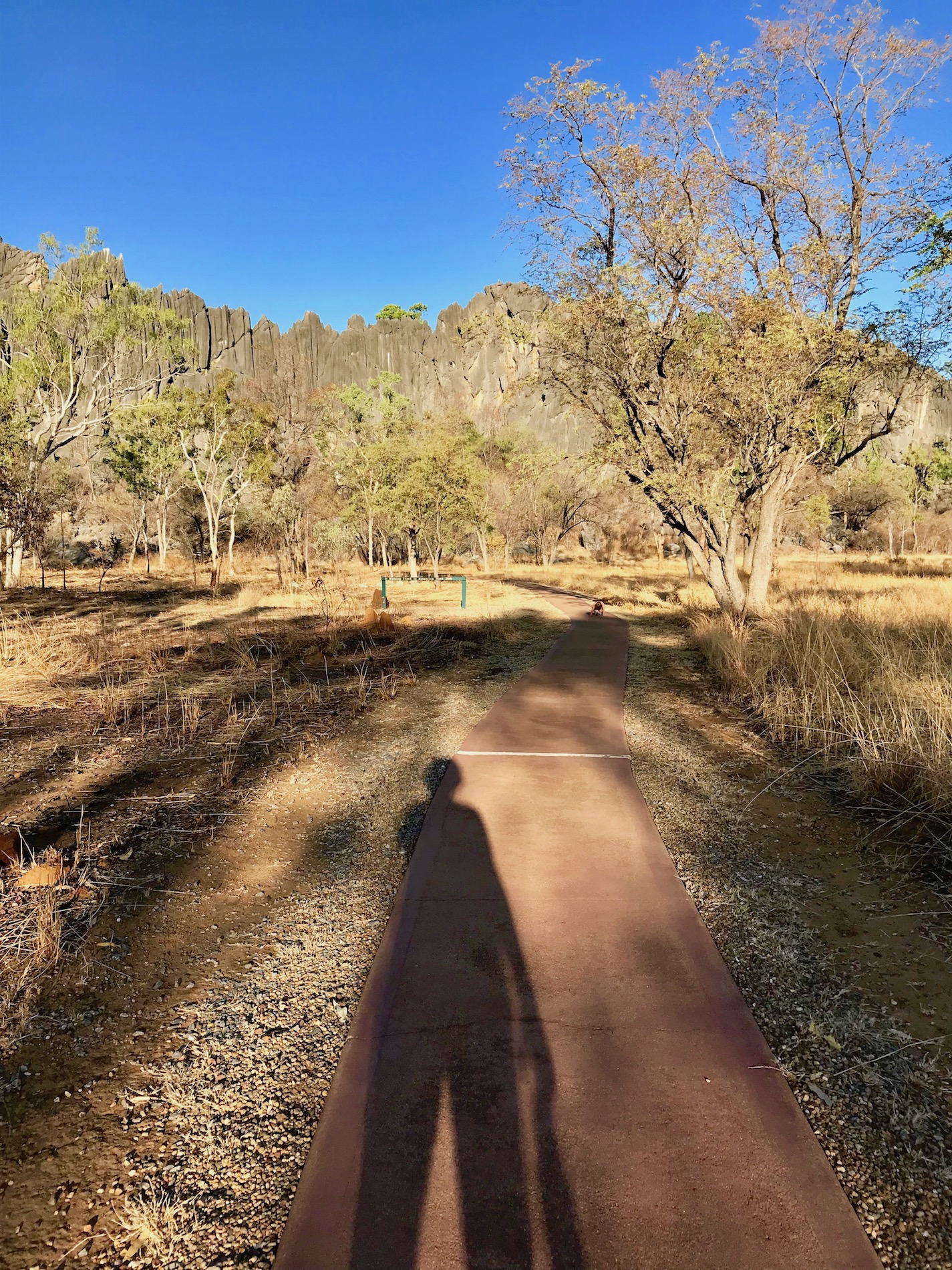I was twenty-one years old and a senior in college when I contemplated global trekking for the first time.
Before that, I had been out of the country twice, once to Montreal and once on a month-long theatre training program at Oxford. But then my parents offered me the chance to take a summer trip, a gift in honor of my graduation.
I am sure they expected me to sign on for a six-week whirlwind adventure in Europe. But I didn’t.
I told them I wanted to go to Australia. I wanted to dive deeper into a world that seemed far removed from my own. It was a long shot, but something in me knew that if I could just get there, I might start to crack open the cocoon in which I had become so comfortable. I convinced my parents to help me make it happen and a few months later my first true adventure began.
I am forty-five now, currently traveling the globe for a year with my husband and two small children.
It’s a wild ride that consists more of temper tantrums and bedwetting than sunrise mountain treks and seaside massages. Full disclosure – traveling with two kids under six is a challenge. It’s taking all the tenacity and inner strength I can muster.
Yet the deeper I get into my current travels, the more I realize that my journey right after college might have been the bravest, most radical thing I’ve ever done.
Australia held me in a world without cell phones or email or internet and taught me how to be the fullest me I could be. It gave me my first chance to meet myself outside of the identities that had been assigned to me through given circumstance: my sheltered middle-class upbringing, my academic pedigree, my privilege.
That’s probably why returning to the land Down Under with my family felt so important. It wasn’t just that I wanted to show them the land I loved way back when. It was that I wanted to show them more of myself.
 All photos courtesy of the author.
All photos courtesy of the author.
Australia was the first international stop on our 13-month journey west. We spent an entire month Down Under. My parents and brother joined us for the first few weeks of the trip so all in all there were seven of us as we made stops in Melbourne, Sydney, the Blue Mountains, and Port Douglas.
Between playgrounds and peanut butter sandwiches, we did all the exceptionally touristy things: the Opera House, the Great Ocean Road, the Great Barrier Reef. We fed kangaroos, held koalas, and marveled at lorikeets and cockatoos. We might have even heard a local play the didgeridoo.
It was intense to be back in Oz.
At times, I could feel the 21-year-old me growing intoxicated with the joy of sharing a beloved place. Other times, I would catch a glimpse of her in the mirror, lingering in the background, looking darn good in clothes I can no longer fit into. The harder I stared at her, the more delighted she would look as she slipped off to a bar I can no longer go to without a babysitter. I wanted to introduce her to everyone, but she was elusive.
I guess I expected that being together with my loved ones in Australia would resolve a loneliness in me that had been nagging for years. That this trip would be a door we could all walk through, and on the other side of that door would be the old me, the “real” me, the me that felt unseen.
But that wasn’t how it went.
My parents and brother returned to the States after three weeks. They were not on sabbatical and had lives to attend to. This meant that my husband, the kids, and I had a whole week alone in-country before we would head on to Tokyo. We chose to spend it in Cairns, “The Gateway to the Great Barrier Reef,” not because we were going diving but because it was the cheapest, most convenient option.
I knew Cairns. I had lived in Cairns for the good part of a year. I had gone to work and paid rent and formed a community there. Cairns was no mystery to me, it was in my bones.
We rented a tiny shared accommodation just outside of the city center. We no longer had the car my parents had hired, so we were on foot. We used the bus a few times, but mostly we walked the streets of Cairns.
To say those streets have changed since 1996 is an understatement.
But my old footprints were still about and I kept stepping in them. I would be laughing with the kids about something, turn a corner and BAM, there was the Cairns library, where I’d spent weeks of my life poring over the only companion texts to King Lear I could find.
We would be searching for a place to grab lunch and suddenly BOOM, I would find myself standing in the exact spot where I had called my mom from an international phone café to tell her I wasn’t coming home… for the fourth time. It was like that everywhere we went.
I was walking in my own shadow.

On one of our last nights before traveling on to Tokyo, we were heading back to our accommodation from a day at the lagoon. Everyone was cranky. Cairns had been relentlessly humid and sun exposure Down Under will undo you if you aren’t careful. We rounded the corner to our street, and the kids stopped in their tracks.
Someone nearby was watching Finding Nemo.
We could all hear it. Our boys knew every word. Nemo. Yes! It was movie night at the hostel on our block and the movie had just started.
The kids wormed their way through the gate that clearly stated, “For hostel guests only.” I darted around to the desk to ask. The Aussie woman who ran the place had seen us walk by every day, sometimes with tantrumming children in tow. But she knew what she was doing. The hospitality industry in Cairns is like that.
“I bet the kids want to see Nemo, eh? Come on in!”
In we went. My three-year-old was ecstatic. The five-year-old acted put out that he couldn’t restart the movie to watch from the very beginning, but that charade fell away within moments. I leaned against my husband and took a deep breath. The air had relaxed. The perfect time of day in Far North Queensland had moved in. I was with my family on an adventure. We were together in Cairns, under a deep Australian sky, watching Finding Nemo.
The other travelers around us were all backpackers in their mid-twenties. On their way from somewhere. Headed somewhere else. Like us, but nothing like us.
The woman on the other side of the table was munching on trail mix and sipping something from a tin cup. She wore cutoffs, a tank top, and flip-flops.
She was maybe twenty-three. I am sure she barely took me in. But I knew her. I knew her footprints.
“Hey!” I wanted to say to her.
“I was a backpacker once too, a rugged budget traveler like you… and even though everyone at home thought I would only make it three months, I was here for a year, and then back for more… only when I landed in Oz it was 1995 and I had no email account, no cell phone, no Instagram… only some vague sense of an identity which was swiftly shattered by the reality that the world is huge and I am small… this wild, wonderful adventure you are on will write the script for who you might become… but in all this time, I’ve never had a way to share any of this with anyone… how could they understand… but I know you will, I’m sure you will… so maybe I could just tell you?”
The woman got up and headed for the stairs. After all, why did she need Nemo? I imagined she had spent the day diving with real sharks out on the reef, snorkeling with real clownfish next to the cute Australian she met on yesterday’s rainforest tour. Hers was a life of pure freedom.
And while traveling with children is a dish full of rich and wild flavors, freedom is an unmistakable flavor I haven’t tasted in years.
Before she disappeared into her room, she paused at the top of the stairs and swatted a mosquito from her shoulder. My hand automatically went to my own left shoulder, as it often does, and brushed the 8-inch scar left there from the melanoma surgery that saved my life four years ago. My short encounter with ‘cancer-light’.
I thought of the funerals I had missed because we were on the road. The three friends who were now gone. You get into your forties and those kinds of things happen. A motorbike accident. An unexpected medical complication. Breast Cancer, not ‘light’.
Then my husband put his hand on mine and I suddenly felt the presence of my family, very much in the here and now.
By the time the movie ended, the courtyard had emptied. It was only the four of us and Nemo.
The next day, we rented a car and drove to a nearby swimming hole so the kids could play in a waterfall. We hugged their tiny bodies and did family slides down the rock formations and picked figs from the ground to smoosh in our hands.
Later, when the kids fell asleep in the car, my husband suggested we drive up the mountain toward Kuranda. He knew I had lived in a house on that mountain twenty-two years ago. I have no photos of it, only memories. He thought we could find it. So, we tried. After an hour or so of driving up to private driveways, my memories began to collapse. I couldn’t figure out which turn was which, and the boys started to wake in that ugly it’s-sundown-and-we’re-hangry sort of way.
“I don’t think I need to see the house again, if it’s still there,” I told my husband. “I think we got close enough.”
I asked him to drive down and we did. Sometimes the best way to say goodbye to your past is to grab a taco at the local mall playground and play hide and seek with your kids.
Goodbye to the freedom. Goodbye to that house on the mountain that no one you know will ever visit. Goodbye to the dreams that twenty-three-year-old girl had of her future.
Travel is different now, but that’s okay with me. I have two kids. Everything is different now.

The next day would be our last in Australia. As we corralled the boys to sleep that night in their shared twin bed, I knew exactly what we should do. I told my husband to rent the car for one more day.
I wanted to see the red dirt.
We drove away from the ocean the next morning, out toward Chillagoe Caves. As we left the reef and the rainforest behind us, the boys chattered away in the backseat. Watch, I told them. Watch the landscape change. There’s more to this country than shrimp on the barbie and tourism offices. More than reef and cassowaries and the Harbor Bridge. Take it all in now, before we leave this place.
By the time we reached Chillagoe, a town of 192 residents, the sun was high and the earth was baked the color of fine terra cotta. We ducked and climbed about in caves as the boys shrieked that they were finding dinosaur bones. We saw no one aside from wild kangaroos and cows and our own shadows cast by the achingly garish sun.

I let them all run ahead at one point and laid on the dirt to stare at the clouds that danced above this sunburned country. They were clouds rich with dreamtime stories.
I released the full weight of my body into the earth, leaving my imprint there like a map of where I’d been. At the other end of a long, twisted lifeline I could feel my twenty-three-year-old self, tugging at me. I tugged back.
And suddenly it dawned on me – none of us would be here had I not been here all those years ago. The boys’ giggles of delight echoed through the vastness and I knew. No. They wouldn’t be here at all.
Twenty-four hours later, we were gone.
I don’t know if I’ll ever see Australia again, but I’m not sure it matters. I was there and it was as real as I remembered. Australia is my magical land, one which gave me the very first inklings of the life I wanted to live. And now, twenty-two years later, that life is even fuller than I expected.
Australia is an exquisite flavor in my life soup, yes, but now I’ve got more.
I’ve got my people with me in all their beautiful messiness and Nemo on the iPad in my carry-on mommy bag and deep red dirt in my soul.
There’s one small piece of Oz that will always be in my back pocket. It turns out, that one small piece is all I need.